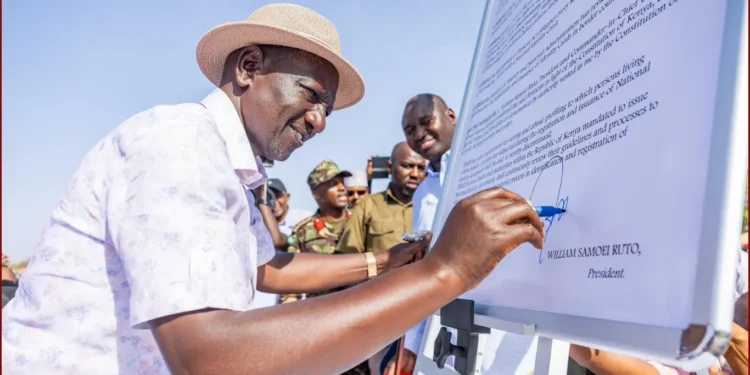- President Ruto scrapped off the extra mandatory vetting requirement for the Northeastern residents.
- 17 plus pledges were issued during his first tour of the region.
- Northeastern residents have suffered negligence at the end of the Shifta War in 1967.
Table of Contents
President Ruto is leaving behind a plethora of developmental pledges on his first visit to the Northeastern region since becoming the President of Kenya.
The vast Northeastern region has been behind in terms of development since independence, something analysts call the biggest travesty of justice ever experienced by the region’s dwellers.
His visit to the region has also been perceived as a political maneuver by his opponents since he lost Mt. Kenya, the biggest voting bloc, after he impeached his former deputy president, Rigathi Gachagua.
The Shifta War and the Aftermath
The region remained in economic and social negligence following the end of the Shifta War of 1963-1967—following Kenya’s independence from the British colonial government.
The Shifta war has been one of the bloodiest conflicts to have ever shaped political history in Eastern Africa. The war was triggered by Kenya’s refusal to allow the Somali-majority Northern Frontier District (NFD) to secede to Greater Somalia, including modern Somalia, Djibouti, and the Somali-dominated regions in Ethiopia.
The war insurgency grew following a referendum, which the British conducted in the NFD, where the majority voted to join Somalia. However, the colonial government ignored the results, handing over the region to Kenya’s government.
The insurgence waged by the ethnic Somali nationalists calling themselves Shifat against Kenya’s government also received backup from the Somalian government—worsening the diplomatic relations between the two countries.
The insurgents launched an onslaught of attacks against Kenyan government positions, leading to the declaration of the state of emergency, the imposition of curfews, and the further establishment of forced settlements to separate the rebels.
The countersurgence by the Kenyan security forces was brutal, inhumane, and detrimental to the social and economic progress of the Somali community. There were reports of human rights violations and destruction of property, including livestock.
The Shifta (bandits in Amharic) war led to the murder of the deaths of thousands in Isiolo, Garissa, and Wajir through the brutal response by the Kenyan government, including the use of the scorched-earth tactics, rape, and direct shoot-to-kill.
Since the end of the Shifta War in 1967, the Somali community has been living in destitution, without proper representation to the government to address their challenges properly. Despite the devolution that seeks an equitable share of national resources across all regions, the region still lacks a proper development framework compared to other regions in the country.
The community has also suffered social integration and cohesiveness as most of them are always perceived as immigrants. This has led to back-to-back unfussiness in the insurance of critical documents such as IDs and passports.
Residents of NFD are often required to go through thorough vetting, which can sometimes take years before getting approved. They are sometimes required to move, particularly to their aboriginal places, before they can apply. These setbacks are degrading the region’s progress.
Vetting requirements for the NFD is one of the promises Ruto scrapped during his first visit to the region. This has elicited mixed reactions from within his political camp and without, as some have perceived this as a national security issue.
“The days when the Northeastern region was not regarded as part of the country are over. We will remove vetting in the processing of national identification cards and passports, which has discriminated against the people of northeastern Kenya for far too long,” President Ruto stated.
However, some have seen this as campaign tactics and political maneuverability—focusing on a second term return after losing the voting basket of Central Kenya on a waned relationship following the deposition of Rigathi Gachagua, former DP.
The removal of vetting requirements for the acquisition of both IDs and passports, however, got a strong upvote and jovial hearts from the region. He also promised to bring the interior and national administration as close as Garissa County for easy processing.
17 Pledges Ruto made to the People of Northeastern- NFD
- Construction of a 500-capacity hostel at Mandera Technical Training Institute (TTI).
- Development of 6 markets worth Ksh 1.8 billion to boost local commerce.
- Establishment of a Ksh 500 million aggregation center for agricultural produce.
- Allocation of Kshs 25 million for the construction of classrooms at Mandera TTI.
- Government funding for the 68 km Modogashe-Samatar road.
- Construction of the 73 km Rhamu to Mandera road to enhance regional connectivity.
- Development of schools and water projects along the 740 km Isiolo-Mandera road.
- Allocation of 1.3 billion for electricity projects in off-grid towns.
- Allocation of Ksh 2.6 billion for electrification projects in Mandera County in the FY2025/2026.
- Completion of the Ksh 3.1 billion Mandera Sewage and Water project.
- Restocking livestock for 1,000 families to enhance food security.
- Elimination of discrimination in ID vetting for Kenyans from North Eastern.
- Reopening of passport application office in the northeastern region.
- Connecting Mandera to the National Grid through Ethiopia for reliable power supply.
- Completion of Moi Stadium in Mandera for sports and recreation.
- Support for irrigation projects along the River Daawa to boost agricultural productivity.
- Construction of 3,000 units under the affordable housing programs in Mandera.
President Ruto has made hundreds of pledges worth trillions of Kenyan shillings, but he hasn’t been able to deliver a quarter of them, according to Kenyans who have been on his trail ever since. Kenyans are also not sure where he’ll be able to deliver all these to the NFD people, given the two years that are remaining before the general elections in 2027.







